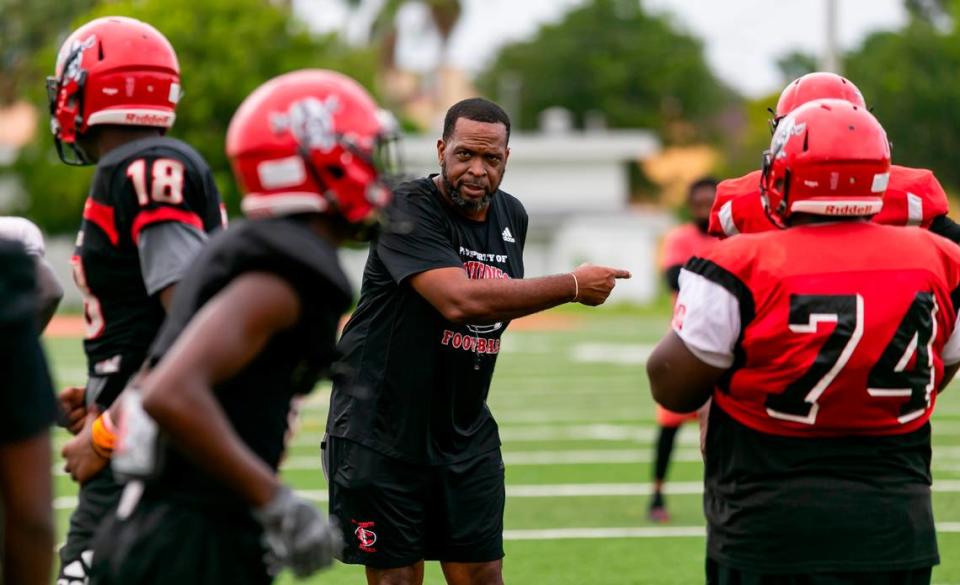The 44 Percent: Hispanic Heritage Month, Haitian Migrants & Uncle Luke
During one of my first college classes, back when I was a freshman at Florida Gulf Coast University in Fort Myers, I got to class a little early and struck up a conversation with a girl sitting close by — a white girl from somewhere out West in the U.S. She asked me where I was from, so I told her I was born and raised in Honduras. She looked interested and immediately responded: “Oh, I have never been to Africa!”
I tilted my head sideways and said, “Yeah, me neither.” We stared at each other for a few seconds as she realized Honduras is located in Central America.

She didn’t mean to hurt or offend me, and truthfully, she didn’t. I just laughed, pulled up a map on my phone and showed her pictures of the beautiful Roatán beaches and the Copán ruins.
To this day, I think about that every time an Uber driver or a restaurant waiter doesn’t quite get my Hispanic heritage. Yes, that happens even in Miami, possibly the most Hispanic city in the U.S. It’s mostly Cubans in the area, so a lot of residents here have never met a Central American, though that’s slowly changing.
I share this anecdote because I think that’s precisely the point of National Hispanic Heritage Month: to breed those interactions and to dive deep into Hispanic culture — no matter who you are, no matter your background. Take myself for instance: my dad is Cuban, my mom is Costa Rican and, like I shared, I’m Honduran, so I’ve got those three countries covered. But I don’t know much about Spain or South America or any of the other Hispanic nations.
As we begin this month, I want to invite you to consciously seek out new experiences, even if it feels awkward or uncomfortable at first. Whether it’s trying a new Argentinian restaurant or attending a concert featuring a Colombian artist, or reading up on the history of the Dominican Republic, let’s all get to know each other better.
To do that, we must raise Hispanic voices. That’s why I want to thank Isaiah for doing that for me and other colleagues in this valuable space. Hope you, readers, get to enjoy this celebration with us.

INSIDE THE 305
‘Joe Biden nou fache’: Protesters in Miami demand asylum for Haitian migrants at border
Being Black at a protest defending the rights of other Black and brown individuals has never been easy.
It’s difficult to separate personal feelings fromthe story. As much as journalism school taught me the importance of objectivity, it also stressed the necessity of emotional intelligence.
That said, I couldn’t help but shed a few tears at yesterday’s protest. My mind immediately jumped to the last time I covered a protest, during the summer of 2020, and the connection between George Floyd and the Haitian migrants at the border. Both images — of Floyd on the ground with an officer on his neck, and of Haitians fleeing mounted law enforcement — were rooted in the oppression that Black and brown people have face in this country for centuries. And as Miami Gardens Councilwoman Linda Julien put it, “We’re tired.”
My hope, however, lies in the hands of parents like Karine Calixte, who brought her two-year-old daughter Acephie to experience the protest.
“God forbid things like this happen when she gets to be older,” said Calixte, who held her daughter in one arm, the Haitian flag draped around them both. “She [will] know that she needs to stand up.”

The many lives of ‘Coach Luke’: Luther ‘Uncle Luke’ Campbell has revived Edison football:
Uncle Luke is a legend.
Put aside the raunchy subject matter of actual music for a second and just think that we might not have the Lil Waynes, Drakes or Trinas of the world without his fight for free speech. But that’s a story for another time.
Uncle Luke, or Coach Luke as he’s called, has injected new life into Edison football and the Herald’s David Wilson breaks down the Miami legend’s love for a sport so ingrained in South Florida culture:
It helped define his childhood, much like it still does for so many boys from the Liberty City neighborhood of Miami. When he grew up, he had to take the bus out to Miami Beach to play in youth leagues and he even played defensive back for Miami Beach in high school. He was, he will readily admit, nothing special, but he crossed paths with players who were. When Campbell was in high school, future Pro Bowlers Lomas Brown, William Roberts, Eddie Brown and David Little were also at Miami-Dade County Public Schools.
If music and entrepreneurship were his way out, football was theirs, and it has been for countless Miamians since, whether it meant going on to the NFL, getting a college scholarship or even just providing structure and discipline to keep kids out of trouble.
“It’s a rite of passage. For New York, it’s basketball. Detroit is basketball. Here in South Florida, we are the football capital of the world,” Campbell said. “What it means to me — it means everything. It means life, it means teaching accountability and responsibility, it means learning to work among each other, learning to work with each other and learning to be your brother’s keeper.”
OUTSIDE THE 305

Alabama to remove racist language from state constitution:
Talk about better late than never.
The state of Alabama has begun to (finally) eliminate vestiges of its racist past from its constitution, a document that still contains references to “voting requirements that were generally used to disenfranchise Black residents” and segregated schools.
As the New York Times’ Tariro Mzezewa described, the move is key step on the pathway to equality.
The redrafting campaign may not be as dramatic as efforts elsewhere to reform the criminal justice system or tear down Confederate monuments, but advocates argue that addressing racist language is a critical part of reckoning with the past.
“It’s not an either-or, it’s a continuum,” said Paul Farber, the director of Monument Lab, a Philadelphia-based public art and research studio dedicated to examining how history is told in the public landscape. “Part of the work is to understand how symbols carry weight and how they are connected to systems that structure public institutions and spaces and opportunity.”
More than that, the updated Constitution could instill a sense of racial pride in young Black and brown kids who happen to stumble upon the Constitution, according to State Representative Merika Coleman.
“If your image, based on what we’re talking specifically about the Constitution, is that you are not worthy enough to vote, you are not worthy enough to marry who you love, you are not worthy enough to have the best education possible, what does that say about who you are?” she asked. “And what about the superiority complex that it creates in non-people of color?”

‘Horrible to watch,’ White House says of image of border agent whipping at Haitian migrant:
By now I’m sure you’ve seen the harrowing image of a mounted border patrol agent appearing to whip a Haitian migrant with horse reins. Like most of the world, I too was shocked by the photo, which was reminiscent of slavery.
Moments like these force Americans to ask themselves what do we truly stand for. In the summer of 2020, we reckoned with the mistreatment of Black Americans at the hands of police. A similar moment is now upon us.
HIGH CULTURE

New documentary teaches about Malcolm X and Muhammad Ali’s brotherhood : If you’ve seen Regina King’s “One Night in Miami,” you might have some idea about Malcolm X and Muhammad Ali’s relationship. If not, do yourself a favor and check out both King’s film and “Blood Brothers: Malcolm X and Muhammad Ali,” a new Netflix documentary.
The project explores the complicated friendship of the two larger-than-life individuals and what eventually brought about their relationship’s end. It will truly make the viewer ponder a question for the ages: what if.
Where does “The 44 Percent” name come from? Click here to find out how Miami history influenced the newsletter’s title.

